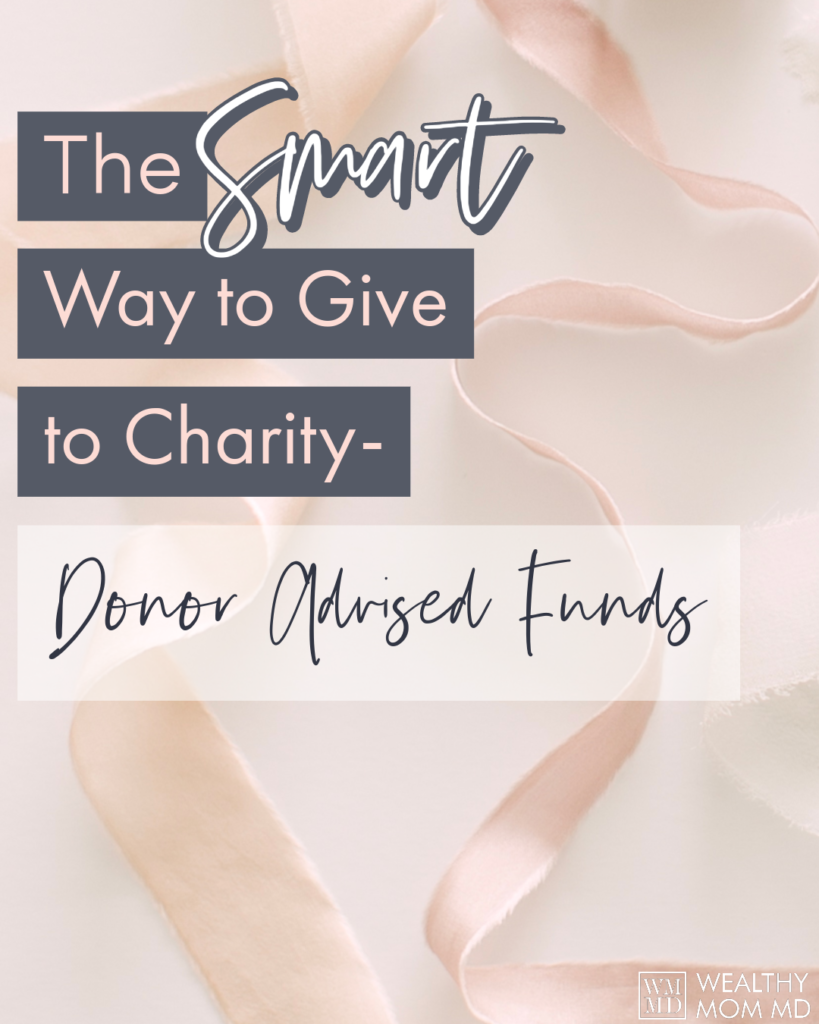Giving to charity and to those in need is on most people’s mind this time of year. The new higher standard deductions that came with the recent tax changes have made it more challenging to deduct donations.
I hope no one gives just for the tax break, but paying less taxes is always a good thing. So, what can you do? Consider opening a Donor Advised Fund!
What is a Donor Advised Fund (DAF)?
A donor advised fund is an investment account for charity. You donate cash or investments. You can then donate to charity from the fund and invest it so it can keep growing (and can keep giving).
The year you donate to the DAF counts as a charitable contribution. Then you are free to take your time to give to individual charities. This means you can make larger lump sum donations strategically, say every other year or so, so that you are able to itemize deductions on your taxes.
But the best part, in my opinion, is that you don’t need to keep track of every donation you make for taxes anymore. You got the tax deduction when you donated to the fund. So that is the only transaction you need to keep track of.
Where should I open a DAF?
The 3 DAF custodians I looked at are Vanguard Charitable, Fidelity Charitable and Schwab Charitable. TD Ameritrade currently only allows institutional clients to open one, but at the time of this writing, Charles Schwab bought TD Ameritrade, so that might change soon.
Fidelity & Schwab have initial account minimums of $5,000 and require a minimum donation of $50. Vanguard requires an initial account minimum of $25,000 and requires a minimum donation of $500. All three accept cash and securities, including appreciated securities.
My recommendation is to choose the custodian you already use for your taxable if that’s an option. Most people will probably go with Fidelity or Schwab for the lower initial minimum and lower donation minimum of $50.

Why donating appreciated shares is a win/win
Appreciated shares in a taxable account is subject to either long term or short term capital gains tax. Long term capital gains starts at 15% (up to 20%) + state income tax + 3.8% extra tax for higher-income folks.
But, if you donate these shares to charity (via a DAF or not), you don’t pay any taxes on it and neither does the charity. They get the fully appreciated shares tax-free if you held the shares for at least a year. And you can write off the amount of the appreciated shares too! So really, it’s a win/win/win in my book.
If you held the appreciated shares for less than a year, you can deduct the original cost (or cost basis) of the shares, not the appreciated value. So it’s best to donate appreciated shares that you’ve owned for more than a year.
Giving via a DAF or via donating appreciated shares is cheaper than “giving cash” due to the tax savings.
Should you give?
Giving is personal. I only started giving relatively recently.
When I was a resident, I said “I'll give when I'm an attending.” That seemed logical – I wasn't making a lot and had student loans accumulating interest every day. Then I became an attending. Then I said “I'll give once I don't have so many loans” or “I'll give once I get some financial footing.”
Somewhere along the way, I discovered Farnoosh Torabi's So Money podcast. I started with her inaugural podcast with guest Tony Robbins. One part really got to me:
People say, ‘When I'm rich, I'll give', they're lying. If you won't give a dime out of a dollar, there's no way you're gonna give a 100 million out of a billion, you're lying to yourself. But if you can do it today, the biggest thing that giving does, is it teaches your brain there's more than enough.
Tony Robbins
Right after I listened to that podcast, I made my first donation – I pledged to give a small amount quarterly to my alma mater Barnard College and specifically earmarked the funds for financial aid. I received generous financial aid in the form of grants and work-study and hope that my small contribution will help someone else attend.
I have since given to:
- Camp Discovery – a summer camp for kids with severe skin diseases
- KACFNY – Korean American Community Foundation of NY
- Village Impact – a foundation that builds sustainable schools in Kenya
My goal for 2020 is to open an account with Vanguard Charitable with at least $25,000. I chose Vanguard since that is where is my taxable brokerage account is, meaning I can easily transfer appreciated shares from my taxable account. One thing I learned this year is that the more money I make, the more impact I can have. Wealthy Mom MD is working on a project where we will donate 50% of the profits to this DAF, I can’t wait to tell you more about it!

Get the bestselling book - Defining Wealth for Women.



